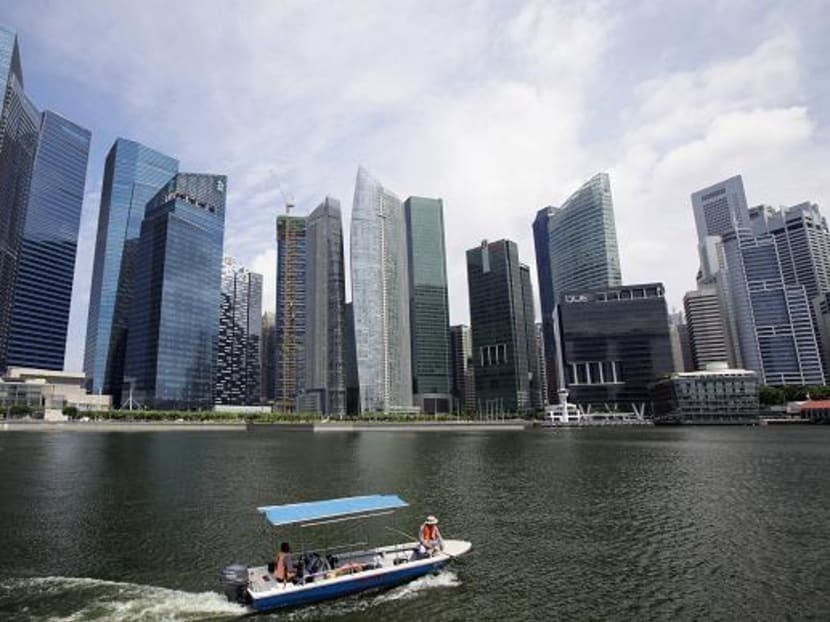Singapore state firms are most acquisitive in 2013
SINGAPORE — GIC and Temasek Holdings are set to lead global sovereign investors in acquisitions for a second year after emerging as the most active in 2013.

A picture of Singapore's skyline. Photo: Reuters
SINGAPORE — GIC and Temasek Holdings are set to lead global sovereign investors in acquisitions for a second year after emerging as the most active in 2013.
The US$15.7 billion (S$19.6 billion) spent by both companies accounted for about a third of direct investments by state investors globally last year, data compiled by the London-based Institutional Investor’s Sovereign Wealth Center showed.
This year, major investments have already been announced: Temasek and one of its units announced two purchases in March, amounting to US$8.9 billion, or 57 per cent of what the two firms invested last year, data compiled by Bloomberg showed.
The acquisitions may set the momentum for Temasek and GIC amid signs of a global recovery: United States data on exports and consumer confidence released this month added to a spate of statistics showing the world’s largest economy is gaining steam heading into the second quarter, with other economies also showing signs of stability and growth.
“I wouldn’t be surprised if GIC and Temasek beat last year’s level of investments,” said CIMB economist Song Seng Wun.
“The global recovery is becoming more entrenched. Investors should buy assets before they get more expensive, and GIC and Temasek are faster than other state funds in seizing the opportunities,” he said.
The combined amount GIC and Temasek spent last year accounted for 32 per cent of all transactions among their peers, dwarfing the percentage of investments by the state funds of Norway, Abu Dhabi and China, which each manage more assets than GIC and Temasek combined.
Norway’s state fund, the world’s biggest, deployed US$5.3 billion last year and China Investment Corp US$1.9 billion.
The total value of the 184 direct investments by sovereign wealth funds last year reached US$43.5 billion, 23 per cent less than the previous year in value, mainly in line with a drop in cross-border mergers and acquisitions, the data showed.
GIC and Temasek made 40 and 38 direct investments respectively last year. Among GIC’s major transactions last year were the purchase of a 50 per cent stake in London’s Broadgate office complex and a 28.5 per cent stake in Goldman Sachs Group’s European insurance business.
Temasek bought a 5.04 per cent stake in Spanish oil company Repsol for €1 billion (S$1.71 billion) last year. The firm’s liquefied natural gas unit Pavilion Energy in November said it would pay US$1.3 billion for a 20 per cent stake in three gas blocks off the coast of Tanzania in East Africa.
“We invest over the long term in sectors which are good proxies to our key investment themes,” said Temasek spokesman Stephen Forshaw. “The mix of our portfolio may change from time to time, not to fit any target that we have, but to cater to new opportunities that emerge.”
Temasek’s holdings jumped to a record S$215 billion in the year ended March 2013, as surging global stock markets bolstered assets.
The Sovereign Wealth Center’s website said Temasek is the ninth-biggest state investor with an estimated US$173 billion of assets, while GIC ranks fifth with an estimated US$315 billion of assets.
“We look at the long-term performance of the total portfolio rather than the performance of individual asset classes or investments,” said GIC group chief investment officer Lim Chow Kiat in an email.
“Our patient capital allows us to benefit from holding investments that take longer to realise their potential.”
Singapore’s political stability and the size of its economy are helping GIC and Temasek to have better access to overseas markets, said Dr Friedrich Wu, an adjunct associate professor at Nanyang Technological University.
Trade-dependent Singapore is also seen as benefiting from an improving outlook for global expansion. The Asian Development Bank (ADB) forecasts South-east Asian growth to accelerate to 5.4 per cent next year from 5 per cent this year, data from a report last month showed.
The US, eurozone area and Japan will collectively grow 2.2 per cent next year from 1.9 per cent this year, the ADB has said.
Emerging markets including Brazil, Indonesia, South Africa and Turkey have undervalued assets, said Dr Wu, adding that many of them are long term and potentially profitable. BLOOMBERG





